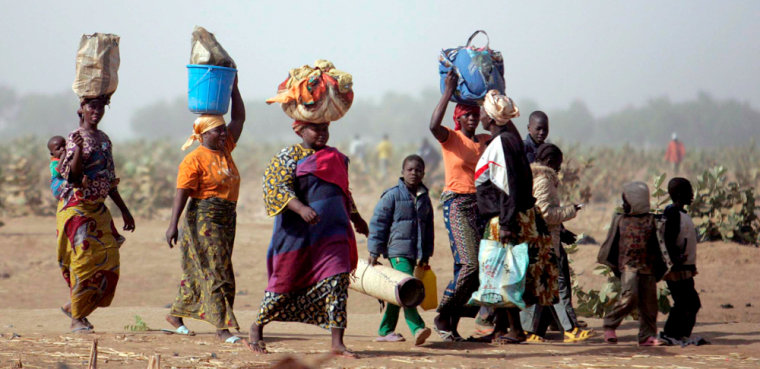The thousands of refugees who fled Chad's capital after a rebel advance into the city were scraping by with little food, water or shelter Thursday, just across the river from home.
The U.N. estimates at least 30,000 people fled to neighboring Cameroon after fighting broke out over the weekend in Chad's capital, N'Djamena. International relief efforts have not yet been mounted.
Rebels who accuse President Idriss Deby of corruption and embezzling millions in oil revenue attacked Chad's capital Friday in trucks mounted with guns. They had advanced in a matter of days from their eastern bases near the Sudan border. They were repelled after bloody weekend battles, but refugees feared fighting would erupt again.
Chadians were still leaving their homeland, though the flow was decreasing. Most were going just across the Chari River from N'Djamena to the Cameroonian town of Kousseri.
"If we go back, we're between the anvil and the hammer," said Ngarmbatinan Mbailemdana, a 23-year-old security guard who fled with his wife and two children. "The country needs real peace before we go home."
Mbailemdana said he ventured back into N'Djamena Tuesday and found his house burned and saw bodies on streets. Others said they were going home in the day to check conditions, then returning to Cameroon to sleep.
Mbailemdana and most of the refugees were sheltering Thursday on a dilapidated school campus in Kousseri. Families were sleeping in the open or under tents made of scavenged tree branches and lengths of cloth women use as skirts during the day.
One water tap at the school served everyone. There were no toilets. Food was available only to those who could afford it, and prices on the local markets were going up because of refugee demand. A loaf of bread, for example, had jumped from 20 local francs to 100 in recent days, area residents said.
"The situation in Kousseri is really quite serious," Jennifer Nazaire, the representative for Catholic Relief Services in Cameroon, said in a statement Wednesday. "Chadians are pouring out of N'Djamena, and there's little set up to receive them at the moment. The Catholic Church in Kousseri, the local government, United Nations, and aid agencies are all scrambling to work out temporary and longer-term measures to host people."
Curfews in the capital
Chad's president said his government had total control of the country and called on the refugees to return. But French Defense Minister Herve Morin said Wednesday his intelligence showed a rebel support column was moving to reinforce the insurgents, and French officials said 100-200 rebel vehicles appeared to have regrouped east of N'Djamena.
Chadian Prime Minister Nouradin Koumakoye on Thursday declared a curfew in the capital and other regions of the country with immediate effect, saying it was to help restore order. Koumakoye also said his government had identified residents of the capital who helped plan the rebel attack and would find and prosecute them. The human rights group Amnesty International said it feared a "major witch hunt" and charged summary killings already are taking place.
Refugee Mbaire Wanda said Chadian officials had visited Kousseri's makeshift camps to try to persuade people to go home.
"I don't think that people dare go home now," Wanda said. "How will people take care of their kids? The markets are burned. The pharmacies have been pillaged. There's no jobs and no money. There's no home to return to."
Violence disrupts, stalls humanitarian work
U.N. workers who were surveying the school Thursday said they were considering moving the refugees further from the Chari for security reasons. Several Chadians were organizing themselves, including compiling a list of those taking shelter there, in anticipation the U.N. would soon step in.
The situation adds to an already daunting challenge for humanitarian workers in the region. While the recent fighting pushed Chadians from their homes in southwestern Chad, earlier fighting between the government and rebels had displaced thousands in the east. Eastern Chad also is home to thousands of Sudanese who have fled fighting in Sudan's Darfur.
No civilian planes — including aid flights — have been allowed into Chad since fighting around the capital started, and relief group Save the Children said it was running out of food and supplies for camps serving more than 500,000 people — including displaced Chadians and Sudanese refugees — in eastern Chad.
The U.N. refugee agency on Thursday called for the speedy installation of a "humanitarian air corridor" from N'Djamena to the refugees in eastern Chad.
The recent fighting also prompted Europe to postpone deployment of a force to protect refugees and aid operations in the east.
